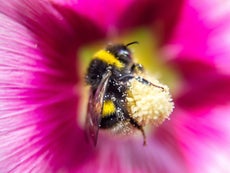
The British government has just given the green light for bee-killing pesticides to be sprayed in the UK. The pesticide being used has been banned for being poisonous to bees, but it’s just been approved to help grow sugar beet in the spring
This is about bees, but it's also about us. If we keep harming bees, we risk our food supplies. It's estimated that a third of our food is dependent on pollinators, of which bees are some of the most important. A third of bee populations are already shrinking. We can’t allow pesticides to destroy our environment and kill any more bees.
Can you sign this petition so we can get the Environment Minister to act fast? only applicable to people living in the UK.
|
“Enforce a total ban on bee-killing pesticides.”
|
|
|
“We cannot afford to put our pollinator populations at risk.” These were the words of Michael Gove when he introduced the ban on bee-killing pesticides in 2018. So how come it doesn´t apply in 2021?
So what’s changed since then? Well, it’s certainly not the science. Pesticides, including neonicotinoids, are still bad news for bees. Studies have shown that these pesticides can affect bees’ navigational abilities and breeding success, and they are unsurprisingly ravaging other insects as well.
The government are now saying that their reasons for allowing emergency use is to protect growers of sugar beet. But this is a short-sighted and dangerous approach to take, especially when you consider we rely on bees to help pollinate lots of crops like apples, beans, squashes and almonds.
George Eustice has the power to change all of this. We have the opportunity to shift away from chemical-intensive agriculture to organic farming that protects nature. As Environment Minister, he can show he’s on the right side of protecting nature by enforcing a total ban on bee-harming pesticides. Can you get the Environment Minister to act now?
We have the power to make George Eustice act. He’s approved this emergency use of a deadly pesticide, but we need to remind him that we’re in the middle of a climate and nature emergency.
We can stop this now. If lots of people sign this petition we can pile pressure on the government to quickly reverse its decision and keep bee-killing pesticides away from our environment.
An article in the Guardian Newspaper reported the following:
A pesticide believed to kill bees has been authorised for use in England despite an EU-wide ban on its use outdoors two years ago and an explicit government pledge to keep the restrictions.
Following lobbying from the National Farmers’ Union (NFU) and British Sugar, a product containing the neonicotinoid thiamethoxam was sanctioned for emergency use on sugar beet seeds this year because of the threat posed by a virus.
Conservationists have described the decision as regressive and called for safeguards to prevent the pollution of rivers with rainwater containing the chemical at a time when British insects are in serious decline.
Formally, EU members in 2018 banned most neonicotinoids for use on crops outdoors, to protect bees. Subsequent decisions by 11 countries to allow emergency use come amid a growing awareness of the harmful role played by refined sugar in the development of long-term health problems.
Matt Shardlow, the chief executive of the invertebrate conservation group Buglife, said it was an “environmentally regressive” decision that would destroy wildflowers and add to an “onslaught” on insects.
The UK, however, has now joined EU countries including Belgium, Denmark and Spain in signing emergency authorisations for its use, according to the Department for Environment, Food and Rural Affairs (Defra).
A similar emergency application for England in 2018 was refused after government pesticide advisers said it would “cause unacceptable effects to bees in flowering crops and flowering plants in field margins”.
It added that it would harm “birds and mammals eating seedlings from treated seed and birds consuming pelleted seed” and risked “adversely impacting populations of aquatic insects”.
Scientists have observed significant declines in some British bee species since 2007, coinciding with the introduction of thiamethoxam, which was previously widely used. Studies suggest that it weakens bees’ immune systems, harms the development of baby bees’ brains and can leave them unable to fly. Another study has found honey samples being contaminated by neonicotinoids.
The proposed use of the pesticide to protect beet crops in the east of England in 2018 was estimated by the government to be worth about £18m. Yields from 2020 are forecast to be down by as much as 25% on previous years, Defra said. The pesticide, sold by the Chinese-owned agrochemical company Syngenta, is advertised as increasing crop yields by 13%.
A Defra spokesperson said: “Emergency authorisations for pesticides are only granted in exceptional circumstances where diseases or pests cannot be controlled by any other reasonable means. Emergency authorisations are used by countries across Europe.
“Pesticides can only be used where we judge there to be no harm to human health and animal health, and no unacceptable risks to the environment. The temporary use of this product is strictly limited to a non-flowering crop and will be tightly controlled to minimise any potential risk to pollinators.”
In the final line of its background statement, Defra added: “Protecting pollinators is a priority for this government.”
• This article was amended on 13 January 2021 to make clear that the EU ban on most neonicotinoids prohibited use outdoors.
Let us hope that these guidelines are adhered to and that the producers don´t find loopholes to use this awful pesticide for a long time. It dismays me to read about this because without the bees we are all in serious trouble. Yet again, money rules.
The blog song for today is:" Price Tag" by Jessie J
TTFN



 As you know I have been looking for ways to avoid buying stuff in plastic containers and have also been searching for ways to make my own products. I have come across an easy recipe for Fabric conditioner, which I have tried and it does work! This means that I can reuse any plastic bottle over and over again, terrific for the planet, and also for saving money!
As you know I have been looking for ways to avoid buying stuff in plastic containers and have also been searching for ways to make my own products. I have come across an easy recipe for Fabric conditioner, which I have tried and it does work! This means that I can reuse any plastic bottle over and over again, terrific for the planet, and also for saving money! 
